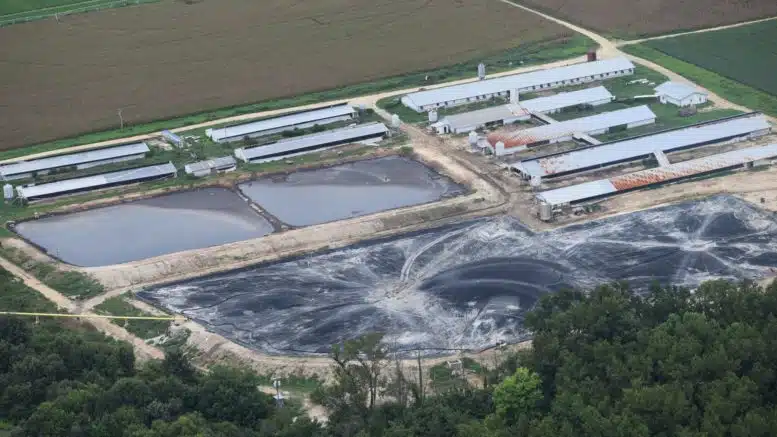By Will Atwater
Last August, during a routine surveillance flyover, Samantha Krop spotted something odd at White Oak Farm, a Wayne County biogas and industrial hog farm operation.
“I noticed that the lagoon, which is a covered lagoon, meant to be producing biogas through the anaerobic digestion process, was flattened, and it just looked different,” said Krop, the Sound River Neuse Riverkeeper.
Curious about what she’d seen during the flight, Krop decided to dig through the N.C. Department of Environmental Quality’s records for possible answers.
“We found sort of a treasure trove of documents outlining a major spill that had happened there over Memorial Day weekend,” Krop said.
In May 2022, the owners of White Oak Farm reported to the NCDEQ that nearly a million gallons of hog feces, decomposing hog carcasses and food waste seeped from a failed hog waste “digester” and spread out over surrounding fields. Of the total waste amount, 10,745 gallons also entered the Nahunta Swamp, a “water of the state,” according to an NCDEQ release issued in December of last year.
Accounts differ regarding how much waste flowed from the site into nearby wetlands. In a Sept. 6, 2022 article, the News and Observer reported that a minimum of “37,000 gallons” of effluent, roughly three times the amount reported by NCDEQ, had reached nearby wetlands.
By the close of 2022, NCDEQ’s Division of Water Resources issued a $34,520 fine to the operators of White Oak Farm “related to a May 2022 waste discharge at an animal operations facility in Wayne County,” according to the agency.
A notice of more infractions
Earlier this month, roughly a year after Krop’s surveillance flyover, NCDEQ sent a letter to B&B Partnership, the owners of White Oak Farm, informing them that the Nahunta wetland is still being affected by runoff from the farm.
Specifically, water sampling tests performed in March and April revealed “high levels of fecal coliform and nutrients in an unnamed tributary to Nahunta Swamp west of the digester at your facility,” according to the letter.
Also spelled out in the letter is that the amount of fecal coliform — the type of bacteria present in feces that can cause illness in humans and animals — far exceeds the allowed standards during testing that extended over at least a month’s time.
The second violation identified in the letter concerns the ongoing point-source discharge into nearby Nahunta Swamp. White Oak Farm is required to “eliminate the discharge of animal waste to surface waters and groundwater through direct discharge, seepage, or runoff,” according to the letter. To achieve this goal, “all earthen structures must include a synthetic liner often made of reinforced polypropylene to prevent seepage.”
Responding to a query from NC Health News about a liner requirement for lagoons, a spokesperson for the NCDEQ Division of Waste Resources offered the following response:
“Under White Oak Farms’s individual permit, the lagoon is clay-lined and does not have a synthetic liner. However, additional groundwater monitoring, with data submitted to the state, was required by the permit to demonstrate conformity with groundwater provisions. Under state law the farm was allowed to expand animal headcount by installing an ‘innovative animal waste system’ intended to prevent groundwater contamination. The recent [notice of violations] sent to the farm, based on surface water monitoring data collected by the Division, noted that the installed system was not functioning as intended or allowed under its permit.”
More digesters, more problems?
As word of the biodigester collapse that led to environmental contamination became public, Krop and other environmentalists expressed disappointment with how NCDEQ handled the situation.
“This facility has a clear history of illegally discharging waste, and DEQ knew it,” Krop said in a release. “They failed to take meaningful action to prevent a major pollution event from happening and failed to adequately notify the public.”
A year later, Krop is glad that NCDEQ has continued its investigation of White Oak Farm.
“It is very encouraging to see that they opened up a pretty thorough investigation and are following up on this with a notice of violation,” she said. “I would say that’s what we would expect as a baseline response, given the severity of this ongoing pollution and the long history of violations at this facility.”
On a scale of one to 10, contract hog farmer and environmental activist Tom Butler said he’d give NCDEQ a two for handling the White Oak Farm situation. He said external pressures limit the agency’s ability to do its job. Butler uses a digester to convert hog waste into energy to power his farm.
However, Butler is sensitive to his operation’s impacts on neighbors and the environment. He frequently speaks about how, he says, the industry and state government value profits above all else.
Cape Fear Riverkeeper Kemp Burdette is concerned that more industrial hog operations, and other entities installing or planning to install digesters to capture and convert methane to natural gas to sell on the market, will lead to more problems down the road.
“When you cover up a digester and prevent it from off-gassing ammonia, for instance, you’re concentrating the nitrogen that’s in the ammonia molecule in the digester,” he said. “So you’re likely to create more problems as water quality impacts go.”









